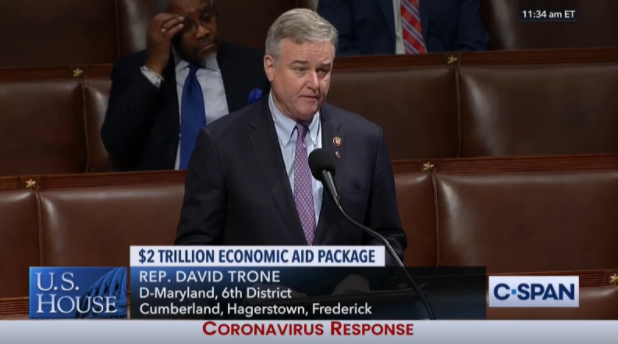Congressman Trone Supports Families and Workers-First Coronavirus Emergency Legislation and the Emergency Relief it Sends to Maryland, Speaks on House Floor

FOR IMMEDIATE RELEASE
Contact: Hannah Muldavin, Hannah.Muldavin@mail.house.gov
Congressman Trone Supports Families and Workers-First Coronavirus Emergency Legislation and the Emergency Relief it Sends to Maryland, Speaks on House Floor in Support
Washington, DC – Today, Congressman David Trone (MD-06) joined in the passage of the Coronavirus Aid, Relief, and Economic Security (CARES) Act, historic families and workers-first legislation addressing the health and economic effects caused by the COVID-19 pandemic. This legislation will now go to the President’s desk for signature.
“This bipartisan effort will bring immediate relief to our workers, families, and small businesses in Maryland and across the country that are feeling the impacts of the COVID-19 pandemic,” said Congressman David Trone. “While this bill is not perfect, the American people need help and they need help now. I will continue to work alongside my colleagues to protect the health, safety, and economic security of the American people in the days and months to come.”
You can watch Congressman Trone’s remarks on the House floor here.
Here are just a few of the numerous initiatives in this historic piece of legislation that will benefit the residents of Maryland.
-
A $150 Billion State and Local Coronavirus Relief Fund: Creates a $150 billion State and Local Coronavirus Relief Fund to provide states and localities additional resources to cope with the COVID-19 pandemic. It is estimated that Maryland will receive $2.3 billion in this funding.
-
$260 Billion in Dramatically Expanded Unemployment Benefits: Provisions set to improve including providing an additional $600 per week for the next four months, providing an additional 13 weeks of federally funded benefits, and expanding eligibility to include workers in the gig economy, part-time, and self-employed workers.
-
Immediate Direct Cash Payments to Lower and Middle-Income Americans: Provides for immediate, direct cash payments to Americans of $1,200 for each adult and $500 for each child, beginning to phase out at an annual income of $75,000 for an individual and $150,000 for a household. These payments will get cash in the pockets of working Americans struggling to pay the bills.
-
More Than $375 Billion in Small Business Relief: Provides more than $375 billion in small business relief, including $349 billion for forgivable loans to small businesses to pay their employees and keep them on the payroll; $17 billion for debt relief for current and new SBA borrowers; and $10 billion in immediate disaster grants. These will not only keep businesses afloat, but will also help keep employees on the payroll.
-
Approximately $200 Billion for Our Hospitals, Health Care Workers, and Health Research: Allocating $200 billion in our hospitals, health systems, and health research, including expanding funding for the personal protective equipment (PPEs) desperately needed by our health care workers, including ventilators, n95 masks, gowns, gloves, etc.
-
More Than $100 Billion in Additional Emergency Appropriations, Including the Following:
-
Transit Agencies: Provides $25 billion to transit agencies to protect the jobs of the employees of the transit agencies, funding their paychecks during this public health emergency. Maryland is estimated to receive $695,418,978 under this program.
-
HUD Emergency Solution Grants: Provides $2 billion for HUD Emergency Solution Grants, designed to protect individuals and families who are homeless or at risk of homelessness due to the COVID-19 pandemic. This program will also support additional homeless assistance, prevention, and eviction prevention assistance. Of this $2 billion, our state will receive$$30,816,055.
-
Child Care and Development Block Grant: Supports child care and early education by providing $3.5 billion for the Child Care and Development Block Grant. Maryland will receive $45,484,102 under this emergency appropriation.
-
Low-Income Home Energy Assistance Program (LIHEAP): Provides $900 million to help low-income families pay their heating and cooling bills. Our state will receive $34,145,000 for this purpose during this public health emergency.
-
Byrne-Justice Assistance Grant Program: Provides $850 million for this program, giving additional support to state and local law enforcement agencies, allowing them to obtain the personal protective equipment and other necessary medical items. Our state will receive $17,276,794 under this appropriation.
-
CDC Coronavirus State, Local and Tribal Grants Minimum Awards: Provides about $750 million in CDC State, Local, and . Tribal Grants Minimum Awards to help agencies cope with the public health emergency. The minimum award for our state is $$17,276,794.
-
Election Assistance: Provides $400 million for Election Assistance Grants for states to help prepare for the 2020 elections. This funding can be used to increase the ability to vote by mail, expand early voting, and expand online registration. Maryland is set to receive $7,422,125 for these purposes.
-
Congressman David Trone was elected to the House of Representatives in November 2018 to serve the 6th District of Maryland, which includes all or part of Montgomery, Frederick, Washington, Allegany, and Garrett Counties. Trone serves on the Education and Labor, Foreign Affairs, and Joint Economic Committees, where he is fighting to make progress on issues that matter to Marylanders, including the opioid epidemic, criminal justice reform, and funding for medical research.
###

